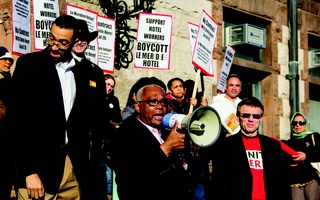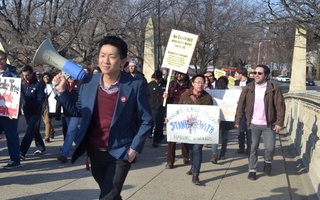Over the past half-century, Harvard University has slowly but surely acceded to unionizing efforts by thousands of workers on campus. For example, the Harvard Union of Clerical and Technical Workers organized and fought for unionization for years before finally winning recognition from the university in 1988. While University officials have on occasion resisted the organizing efforts of labor groups on campus, they have largely acquiesced to worker demands and have allowed unions to become an integral part of Harvard’s labor landscape. On-campus, unions work to ensure that Harvard treats its employees with respect. By negotiating contracts for fair wages and promotion processes, they establish a safe forum for workers to air their grievances. In the past, union organizing at Harvard has resulted in numerous victories for workers, including a successful living wage campaign in 2001. Thankfully, these efforts rippled into the larger community, providing decent wages and benefits for thousands of workers and their families.
Last year, dining hall workers at Harvard Law School organized and joined Unite Here! Local 26, the union that currently represents dining hall workers at the College. During this process, the Harvard administration remained neutral and did not seek to influence the workers’ decision. The HLS workers opted into the contract previously negotiated by Local 26 for other food-service workers, granting them the same wages and benefits enjoyed by their colleagues. Once the majority of workers expressed their desire to form a union, University officials respected their decision. Although Harvard often receives unionization efforts with trepidation, unions are clearly valued organizations on campus that deserve respect from the administration.
Unfortunately, Harvard has a different policy with regard to the organizing efforts of workers under the auspices of its off-campus investments. Harvard owns a variety of companies ranging from natural resource extractors and apartment complexes to hotels in and around the Boston area. While the University upholds admirable standards for its on-campus employees, it does not demand that those employed by its off-campus holdings be offered the same level of protection.
In 2005, Harvard purchased the DoubleTree Suites across the river in Allston, a hotel operated by Hilton Hotels Boston. Workers at the DoubleTree have accused the management of disregarding their grievances and slackening or neglecting important worker protection standards. Many other workers at the hotel cannot afford the company health insurance for their families. Even though the hotel is operated by Hilton, Harvard directly profits from these workers’ exploitation. Moreover, the University pays no real-estate taxes on the property, due to its status as a non-profit institution. The University has the capacity and the responsibility to step in and change the situation.
Against this oppressive atmosphere, the DoubleTree workers spent three months secretly organizing a fair process to decide on unionization. On March 12, over 60 workers, students, and community members petitioned the hotel’s management to give the employees a fair process to decide on unionization. With a fair process, management would agree not to intimidate workers and would allow them to unionize when more than 50 percent of the employees sign union cards. Felix G. Arroyo, councilmember at large for the city of Boston, attended the delegation and spoke to the workers and the management in favor of a fair process. His presence and continuing support shows that the plight of the DoubleTree workers resonates deeply and enjoys broad-based support from the local community. To support the workers’ right to a fair process is not a fringe political stance of the far left, and Harvard should take an active role in pressuring the hotel management to respect worker demands and assent to this fair process.
On-campus workers have the full rights and protections that accompany employment at the most prestigious university in the world. Workers at Harvard-owned businesses should be extended those same rights. Some may argue that Harvard is not responsible for the business and labor practices of its investments; however, as students who directly benefit from those investments, we have a responsibility to push our university to foster a respectful and humane labor environment on and off campus.
The workers at the DoubleTree are not fighting for unreasonable requests. They are simply asking that Harvard live up to its reputation and act as a positive force for workers in the community, a widely supported request. These working men and women are demanding the same treatment that workers on this side of river have received for decades. This Saturday at 2:15 p.m., they will rally in front of the Science Center to publicly ask the Harvard administration to give them the respect they deserve; all community members are welcome to join. The DoubleTree is Harvard’s hotel, and its workers deserve Harvard’s standards.
Gabriel H. Bayard ’15 is a social studies concentrator in Lowell House. Matthew E. Stolz ’14 is a social studies concentrator in Pforzheimer House.
This article has been revised to reflect the following clarification:
CLARIFICATION: January 28, 2014
An earlier version of headline of this article and statements in the article stated that the DoubleTree Suites hotel is Harvard-owned. To clarify, the company is housed in a Harvard-owned building.
Read more in Opinion
What’s Going OnRecommended Articles
-
 Activists Call for Fair Labor Practices at Le Méridien Hotel
Activists Call for Fair Labor Practices at Le Méridien Hotel -
Harvard, Be a Responsible Owner!Our commitment to transparency, fairness, sustainability, and human dignity should not end at Harvard’s gates. Harvard must be a responsible owner of all its investments, particularly of the companies in which it owns a controlling stake
-
Protesters Support Unionization Efforts of DoubleTree EmployeesAbout 60 protesters gathered in front of the Smith Campus Center on Thursday afternoon to encourage the University to support the unionization efforts of employees at the DoubleTree Suites by Hilton Hotel Boston, which is housed in a Harvard-owned building.
-
Don’t Boycott the DoubleTreeA central aim of the boycott is to influence the DoubleTree management’s choice between two legal unionization processes. That alone does not warrant intervention by Harvard.
-
 DoubleTree Workers Call on Sandberg to Aid Unionization Process
DoubleTree Workers Call on Sandberg to Aid Unionization Process













